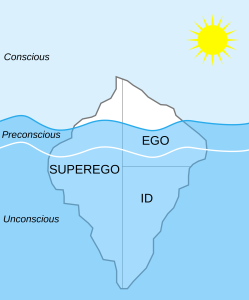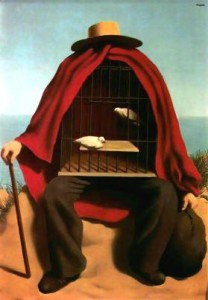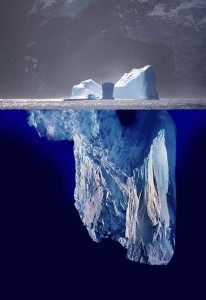Phil Dick Boulevard: Precognition, Karma, and the Unconscious
Saturday, 30 January, 2016
Until you make the unconscious conscious, it will direct your life and you will call it fate. — Carl Jung
Ever since Freud formulated his theory of the unconscious, it has troubled philosophers, because it seems self-contradictory. Thinking is closely allied to consciousness, after all, so how can we have thoughts that we do not know we’re thinking? For Sartre, this conceptual impossibility revealed the falsity of Freud’s theory; in Being and Nothingness, he questioned the possibility of a “censor” in the mind which both was aware of what it was censoring but somehow alien or other than our ordinary consciousness.The future is more coherent than the present, more animate and purposeful, and in a real sense, wiser. It knows more, and some of this knowledge gets transmitted back to us by what seems to be a purely natural phenomenon. We are being talked to, by a very informed Entity: that of all creation as it lies ahead of us in time. — Phil Dick
The unconscious may be nothing but future consciousness as it informs present thought and action. Precognition and the unconscious may really be the same thing.
He cites as an example the “resistance” seen in analysis—”the patient shows defiance, refuses to speak, gives fantastic accounts of his dreams, sometimes even removes himself completely from the psychoanalytic treatment. It is a fair question to ask what part of himself can resist.” To Sartre, it was absurd to speak of an unconscious part of the self that nevertheless knows what it is resisting, which implies consciousness. Thus he argued that any supposed determinism by an ‘unconscious’ formation in the psyche is really a red flag of “bad faith,” the failure to take responsibility for our actions. There is no unconscious, just the avoidance of responsibility.
Something like this view prevailed also in scientific psychology through most of the 20th Century. But despite their continued hatred of Freud, people in the brain and behavior sciences have been forced over the past couple decades to concede the existence of massive amounts of processing in the brain that is truly unconscious. We now know lots of stuff occurs in our heads that we are unaware of, much of it similar to what Freud originally described. There appears to be thinking, sensing, and feeling occurring that is not thought, sensed, or felt, and our non-experience of this huge domain is much more than a matter of bad faith (although there is that also).
 Much of the parapsychological literature points to this same, enigmatic dimension of “unthought knowns” (to misappropriate a term by Christopher Bollas) that seem to carry information not only about our embarrassing or forbidden desires but also about our own immediate or more distant future. Precognition is a fundamentally unconscious phenomenon, and when it manifests consciously it tends to do so through the very same oblique, associative and somatized pathways that the classical “repressed” stuff of psychoanalysis does, as well as memory more generally.
Much of the parapsychological literature points to this same, enigmatic dimension of “unthought knowns” (to misappropriate a term by Christopher Bollas) that seem to carry information not only about our embarrassing or forbidden desires but also about our own immediate or more distant future. Precognition is a fundamentally unconscious phenomenon, and when it manifests consciously it tends to do so through the very same oblique, associative and somatized pathways that the classical “repressed” stuff of psychoanalysis does, as well as memory more generally.The argument that many parapsychologists are making lately is that the source of psi material is “outside the head” in some transpersonal, collective, or otherwise nonlocal and immaterial conscious medium. I make a different proposal: The unconscious and psi are in our head, but not in our head at this moment.
The entire phenomenon of the unconscious, along with many if not all psychic phenomena, point to the brain as a fully four-dimensional processor of information. Elsewhere I’ve proposed how this may work given recent advances in quantum computing and quantum biology. The unconscious may be nothing but future consciousness as it informs present thought and action; manifestations of psi provide direct evidence that this is the case. Precognition and the unconscious may really be the same thing.
The More Informed Future
Part of our difficulty imagining such a possibility comes from the spatial metaphors we use to imagine mental processes. We think of layers of consciousness as vertically piled strata: The unconscious is a substrate, something underneath us, buried under the earth or submerged in murky water … or perhaps it is over our heads, up in the sky, obscured by clouds. Thinking of the unconscious as another ‘simultaneous’ layer of thought assumes, although without basis, that it is “there already” but just unseen. It is probably impossible not to construe temporal relationships via spatial metaphors, but a better place to situate the unconscious would be ahead of us, in front of us. In other words, consciousness and the unconscious may be displaced from each other in time, not in space.
We can’t find the origins of our thoughts because those origins haven’t happened yet. We haven’t yet gotten to where we (will have) thought them in the first place.
Jacques Lacan almost sorta hit on this with his understanding that “repressed” material derives its meaning from (or at least in) the future. He writes in his last Seminar, “what we see in the return of the repressed is the effaced signal of something which only takes on its value in the future, through its symbolic realization, its integration into the history of the subject.” But he didn’t go quite far enough. I would add that what defines a repressed or unconscious thought is not simply that you are not thinking it consciously, but that you are not thinking it yet. You can never prove it was there until it is there … for exactly the same reason that we cannot prove the veridicality of a supposed telepathic or clairvoyant experience until the future moment of feedback or confirmation. Instead of the unconscious being something happening on another, obscured layer of cognitive processing, it is something that is destined to become conscious in a future moment, such as a moment of therapeutic insight or an accidental revelation like a slip of the tongue, or perhaps just an “aha” moment. More generally, the unconscious could be described as what hasn’t been consciously thought yet but that somehow shapes or perturbs our behavior anyway.
 Psi (as I have been arguing in recent posts) suggests that the brain is an organ that reaches forward across our timeline, pulling thoughts and insights from the “more informed” future. Animals are so good at living, miraculously effective at moving through their environment, because of this relation to a future self that knows just a little bit more than the present self does. If this is the case, and abundant presentiment research supports it, then it provides answers not only to psi but to the nature of the unconscious in its relation to consciousness. The brain (and who knows, maybe even smaller cellular units or cells themselves) thinks across its history, not just in the instant.
Psi (as I have been arguing in recent posts) suggests that the brain is an organ that reaches forward across our timeline, pulling thoughts and insights from the “more informed” future. Animals are so good at living, miraculously effective at moving through their environment, because of this relation to a future self that knows just a little bit more than the present self does. If this is the case, and abundant presentiment research supports it, then it provides answers not only to psi but to the nature of the unconscious in its relation to consciousness. The brain (and who knows, maybe even smaller cellular units or cells themselves) thinks across its history, not just in the instant.Your consciousness thought processes right now (and most likely, along with a fan of multiple other conscious moments) are the unconscious of you a few seconds ago, a few minutes ago, or a few hours ago, and even a few weeks or years ago. Stated differently, your future consciousness is the unconscious of your present moment, quietly animating and informing your thoughts and actions, maybe causing a slip of the tongue or (if you are sleeping) a dream, or giving you some intuition or hunch of where to go and how to proceed, or perhaps even generating an uncanny “synchronicity.”
What Goes Around, Comes Around
This ongoing cycling of information through time, the way present thought and action alter our future potentials and the way future brain states “reflux” into the past, is very close to the Eastern concept of Karma.
The future is literally where the “karmic seeds” are planted and, thus, whence they arise in the form of our thoughts and inspiration for action, through the retrocausal logic of psi.
Buddhist meditators have studied consciousness for thousands of years, and Buddhist psychology (specifically the Yog?c?ra school) makes a central place for alaya-vijnana, usually translated as “store consciousness” or “substrate consciousness.” When you trace back the origins of thought through your associative mental thought-stream in meditation, the trail eventually goes cold and you hit a brick wall: Thoughts literally arise from nowhere, and it is a bit of a surprise when you confront this. How can a thought have no visible cause or origin? Yet in spite of this, new thoughts that emerge after an interval of mental stillness are not random. They bear unmistakable traces of our concerns and our past thoughts and actions—it is like our old thoughts just went underground for a while before reemerging nearby, like some garden worm. They seem to have an underground life that we do not and cannot see.
Store consciousness is thus very similar to the Freudian unconscious, a place where our thoughts hide out before manifesting in some new thought or action (including unpredictable and possibly surprising thoughts, symptoms, and dreams). Like the implicit Freudian spatial-conceptual metaphoric map of mind, Buddhist psychology also places store consciousness underneath us, imagining it as a ground that we traverse. It is metaphorically seen as a kind of soil, and our actions are likened to seeds that, after a period of hidden germination, sprout onto the surface as new thoughts and actions. Karma is the planting of these seeds and reaping them as the ongoing cyclical horticulture of mind. (The work of meditation is sometimes described as “burning” these seeds so they lose their power to germinate or generate new thoughts.)
 But I think this new, psi-based conception of four-dimensional mind can really transform how we think of “store consciousness” as well. We just need to up-end the planter, stand it vertically: The fallow store consciousness is nothing but the future in front of us, and Karma is our two-way interrelationship to this future unfolding of mind. In other words, the future is literally where the “karmic seeds” are planted and, thus, whence they arise in the form of our thoughts and inspiration for action, through the retrocausal logic of psi, the refluxing of future experience into the past.
But I think this new, psi-based conception of four-dimensional mind can really transform how we think of “store consciousness” as well. We just need to up-end the planter, stand it vertically: The fallow store consciousness is nothing but the future in front of us, and Karma is our two-way interrelationship to this future unfolding of mind. In other words, the future is literally where the “karmic seeds” are planted and, thus, whence they arise in the form of our thoughts and inspiration for action, through the retrocausal logic of psi, the refluxing of future experience into the past.Again, the future not only informs the present in the form of rare psychic visions and premonitory dreams; it is actually (I am suggesting) the very source and origin of present thoughts and imagination. The wall meditators hit when trying to peel back the layers of consciousness is the wall of time itself, the wall of the Not Yet. We can’t find the origins of our thoughts because those origins haven’t happened yet. We haven’t yet gotten to where we (will have) thought them in the first place.
A Game of Charades
This forces us to confront some basic philosophical fundamentals, such as the nonexistence of the past. We can know intellectually that the past doesn’t exist, but it is very hard to really accept or confront that there is no solid record “behind” or “below” us. All there is, really, is change, and the possibility of imaginatively reconstructing a “past moment” that is different from the present moment, by forensically interpreting the present in such and such a way. But the past is always an image or construct in the present. Thus the things we leave behind, the traces we leave, including the moral traces of our actions in Karma, or the traumas that serve as the seeds of our neurotic symptoms, have nowhere to go in the past—they go into the future.
We only “see” the future when something we are seeing in the present, or something from our past in memory, stands out more vividly because it happens to match or resemble that not-yet-materialized thing.
The neurological description is that they do this by altering the strength of synaptic connections. Every time you have a thought, it is reinforcing certain synapses, and the longer you go not having other thoughts, those associated synapses weaken. There are no “memory traces” as such in the brain, hidden in the folds of tissue like fossils in the earth; there is just an unfolding neverending weather pattern of cortical firing across a hundred billion neurons and trillions of synaptic junctions. Thus every thought and action leaves its “karmic” traces in the subtly altered propensity (or potentiation) of future action. If I’m right, quantum entanglement in many of those hundred billion neurons is causing future information to be fed back into the past, also in the form of altered potentiation—a kind of bending or skewing of present perception toward stimuli that have associative links to something coming down the pike.
Precognitive information is almost never clear or unambiguous, because it lacks context; and in a way, this may be the whole difference between the past and the future. Present consciousness has no way of knowing what the future is or recognizing thoughts from the future because there are no sensory experiences already associated with them in memory; those experiences are what provide the context for autobiographical events, enabling us to situate them in our history … making future information a bit like letters with no return address. Information from the future, lacking a context of lived sensory experience, can only emerge in consciousness by perturbing present experience or drawing forth past memories that resemble it.
 When something seen now rhymes with or matches a future idea or experience, the present stimulus is noticed with greater force than it otherwise would. We pay attention to it, it may even have a slightly luminous or numinous quality, and it may generate an odd train of thought whose significance only becomes apparent once the future experience occurs.* Thus our future is constantly playing a game of charades with us. The charades-like quality is not intentional game-playing, the “trickster”-like behavior of our “higher self” teaching us lessons. It is just the associative nature of the links that connect information in the brain through time, the altering of the potentials of our thought, and the fact that the future lacks the lived biographical context that the past possesses.
When something seen now rhymes with or matches a future idea or experience, the present stimulus is noticed with greater force than it otherwise would. We pay attention to it, it may even have a slightly luminous or numinous quality, and it may generate an odd train of thought whose significance only becomes apparent once the future experience occurs.* Thus our future is constantly playing a game of charades with us. The charades-like quality is not intentional game-playing, the “trickster”-like behavior of our “higher self” teaching us lessons. It is just the associative nature of the links that connect information in the brain through time, the altering of the potentials of our thought, and the fact that the future lacks the lived biographical context that the past possesses.This accounts for why coincidence really plays an important role in psi, even though synchronicity per se (as Jung defined it) is a fiction: We only “see” the future when something we are seeing in the present, or something from our past in memory, stands out more vividly because it happens to match or resemble that not-yet-materialized thing. Something in the past or present that is like something in the future acts as a seed of psi. We see this again and again in precognitive dreams, visions, etc.: They crystalize around something in memory, or some thought arising naturally through immediate experience, that will be seen to resemble the future event or thought or feeling.
Phil Dick Boulevard
So if I am right, the unconscious is just ordinary waking consciousness at other moments in time, or more likely a range or fan of multiple other moments, that contributes to shaping present perception. It is not so much that the future “communicates” with us in the present as that it subtly biases or skews our present thought and perception by altering our cortical potentials.
Future physics and neuroscience will be able to crack the nut of how psi works, but we need to give it time—including time for many of the current anxiously “classical” generation of skeptics to die off.
Yes, this is a reductive, materialist argument, and thus I’m being super naughty. Bad, bad me. But it is a testable hypothesis, and also a parsimonious one, that makes sense of a lot of otherwise wildly disparate anomalies.** It also suggests that it is our age-old spatial metaphors of mind that in part trip us up in solving the psi conundrum. Shifting to the language of “nonlocality” doesn’t help; that just implies broad connection across space and time, without offering any explanation for how we become connected to specific certain things that personally matter to us, that we want to know and indeed will know in our future (the key piece of evidence that is so often ignored—that is, the role of feedback).
Future physics and neuroscience will be able to crack the nut of how it works, but we need to give it time—including time for many of the current anxiously “classical” generation of skeptics to die off and make way for the fully quantum future in which informational time travel is not so unthinkably radical or scary.
 We can start now by resisting (as much as possible) unhelpful mental models of mind, like the submerged icebergs or subterranean regions that implicitly constrain our thinking about the unconscious. The unconscious is not sequestered beneath consciousness, some “other” hiding out of sight, thinking without our awareness and permission, or walled off behind barricades. Nor is it a “higher self” hovering over us and stage managing our affairs like a big teacher or parent in the sky. And the store consciousness that gives rise to Karma isn’t a fertile ground we walk over and leave seeds in. It is the landscape that unfolds before us as we walk down the road. That figure up ahead is you. It’s Phil Dick Boulevard, and we’re all traversing it.
We can start now by resisting (as much as possible) unhelpful mental models of mind, like the submerged icebergs or subterranean regions that implicitly constrain our thinking about the unconscious. The unconscious is not sequestered beneath consciousness, some “other” hiding out of sight, thinking without our awareness and permission, or walled off behind barricades. Nor is it a “higher self” hovering over us and stage managing our affairs like a big teacher or parent in the sky. And the store consciousness that gives rise to Karma isn’t a fertile ground we walk over and leave seeds in. It is the landscape that unfolds before us as we walk down the road. That figure up ahead is you. It’s Phil Dick Boulevard, and we’re all traversing it.NOTES
*This is why meditation is so crucial to getting more in tune with our precognitive nature, and why Zen is a particularly useful path. The more the mind is placid, the more we can focus on small perturbations of thought, and detect oddities in our train of thought. In my experience, precognition manifests in waking life most often in odd trains of thought sparked by random everyday events.
A valuable tool created in the field of ecological psychology is a method called “experience sampling”: Participants are prodded at random times throughout the day using a pager to pause and reflect on and record what they were just thinking at that moment. It is a surprisingly difficult task for some people who are unused to observing their thought-stream, but they invariably find it not only surprising but really rewarding. The basic idea is to get in the habit of noticing what you were just thinking a second or a few seconds ago. It is in those innocuous thoughts just before you decided to notice your thoughts that the answer to not-yet-formulated questions can often be found.
Synchromystics, take note here: The practice of experience sampling greatly increases the number of synchronicities in your day. But it may persuade you that synchronicity is nothing but your own precognitive nature that you have until now failed to recognize.
**The Fortean sense of an “unseen world” or multidimensional parallel realities all around us, intruding on or intersecting our reality, could be part of this same misunderstanding or misdiagnosis of our precognitive nature. We mentally picture frequencies of a “superspectrum” (a la John Keel) as simultaneously coexisting bands on reality’s radio dial, layered over or next to each other, the same way shamanic cosmologies imagine vertically layered spirit worlds. But what looks like an “already existing” parallel reality could instead be other-temporal (past or future) perceptions or thoughts or experiences drawn into present conscious awareness through the associative logic I’ve described. How might this idea help illuminate UFOs, ghosts, and abduction experiences?

Thanks to Eric at: http://thenightshirt.com






 Sat Mar 23, 2024 11:33 pm by globalturbo
Sat Mar 23, 2024 11:33 pm by globalturbo

